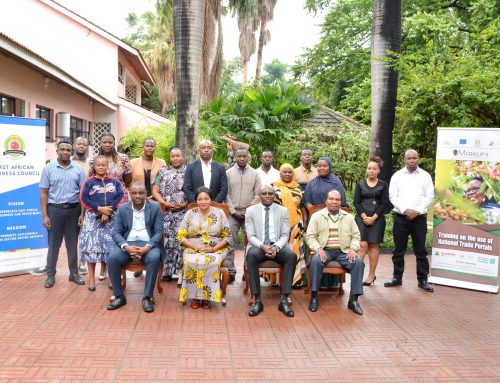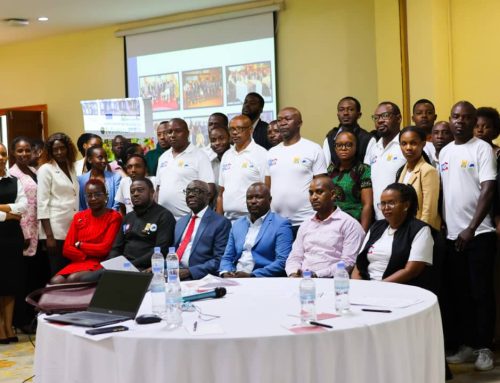- EABC –GIZ launch Study on Impact of Global Crises on Food Security in EAC
Tuesday, 16th May 2023 Arusha, Tanzania: The East African Community (EAC) region’s food insecurity is exacerbated by natural disasters, climate change, and now global crises of the COVID-19 pandemic and the Russia-Ukraine war. This was revealed during the webinar on the impact of global crises on food security in the EAC and Kick-Off of the Project on Enhancing Competitiveness of Agri-Food Industry and Mitigating the Impact of Global Crises to Improve Food Security in the EAC, organized by the East African Business Council in partnership with Sequa GmbH under the Business Scouts Fund.
The webinar convened high-level policy decision-makers and 60 agri-value chain actors to validate the study on the impact of global crises on food security in the EAC conducted by the East African Business Council in partnership with GIZ Business Scouts for Development.
In her remarks, the Chief Guest, Hon. Francoise Uwumukiza, Chairperson of EALA Committee on Agriculture, Tourism, and Natural Resources emphasized on the establishment of a gender-sensitive food response plan in the region.
Hon. Francoise said, “Food security is paramount for inclusive economic growth in the region.” She said EALA is committed to playing its legislative, oversight, and representation roles in collaboration with other partners to end hunger, call for quick implementation of agricultural policies, eliminate Non-Tariff Barriers, and tackle inflation for improved food security in the region.
Mr. Kalisa appreciated the partnership of Sequa and GIZ Business Scouts for Development in the Project on Enhancing Competitiveness of Agri-Food Industry and Mitigating the Impact of Global Crises to Improve Food Security in the EAC. He said that under the project, EABC would conduct training on agricultural topics ranging from sustainable supply chains, smart agriculture, contract farming, and export procedures to empower agriculture value chain actors, including women, youth, farmers, and SMEs.
Hon. Francoise Uwumukiza, Chairperson of EALA Committee on Agriculture, Tourism and Natural Resources accompanied by Mr. John Bosco Kalisa, EABC CEO, and Mr. Philipp Glaeser, Head of International Component, GIZ Business Scouts for Development, officially launched the study on the impact of global crises on food security in the EAC and kicked off the project on Enhancing Competitiveness of Agri-Food Industry.
The study reveals that the EAC is a region that faces challenges of food security, with Partner States as net food importers. The food production index for the EAC region is still low, and the bloc experienced low food production levels between 2014-2017. The region’s staple food products are mainly cereals, such as maize, rice, and sorghum, which have a high import dependency ratio.
“The global crises, such as COVID-19 and the war in Ukraine, have led to volatile global and regional food prices, which have impacted food security. On the positive side, the EAC countries have shown quick adaptability to the pandemic, with some countries improving their Global Food Security Index (GFSI) scores,” said Mr. Kalisa, EABC CEO.
The study shows that, prior to the COVID-19 pandemic, only Kenya had a score above average in the Global Food Security Index (GFSI), followed closely by Rwanda and Uganda. At the height of the pandemic in 2020, only Burundi and the Democratic Republic of Congo (DRC) improved their scores, with 37 and 40.7, respectively. However, there was a consistent improvement in Uganda, Rwanda, and Tanzania’s GFSI scores from 2021 through to 2022, indicating quick adaptability to the pandemic.
“We will promote sectoral exchange and know-how transfer through the network of Business Scouts Programme by getting contributions from German Private Sector such as the Federation of German Food and Drink Industries (BVE), Federation of German Industries (BDI) and German Organic Food production Alliance (BOELW), we will have sectoral exchange and know-how transfer that will contribute towards sustainable supply chain while repositioning and strengthening the competitiveness of agri-food in East Africa particularly MSMEs,” said Mr. Philipp Glaeser, Head of International Component, GIZ Business Scouts for Development
All countries in the region experience some form of climatic challenge; however, the severity of the challenges does not cut across the whole region, creating opportunities for food production and trade in the region. The disruptions in the food supply chain caused by the Russia-Ukraine war have had a significant effect on the EAC’s food security, leading to increased food inflation. Food insecurity is exacerbated by export bans and the imposition of export taxes making food prices making high energy food out of reach for the poor.
The study reveals that the EAC Partner States are prone to hunger compared to the global community, as revealed by the Global Hunger Index Report 2022. The EAC’s staple food products are mainly cereals, such as maize, rice, and sorghum, and cassava, beans, vegetables, sugar, wheat, millet, and pulses. As of December 2021, East African countries recorded a total trade of $182.6 million in cereals. The share of the total cost of staple food in a healthy diet is, on average, 15% of the total cost of food. Export restrictions have usually targeted staple foods that account for the food security of a country. The food production indices for the EAC region are similar, with 2014-2017 being the lowest levels of the region’s food production levels.
In order to cope with the emerging global crises and enhance EAC agri-food systems’ resilience with regard to availability, safety, and sustainability of nutritious food at prices affordable to all, the study recommends that the EAC should increase and diversify food production and transformative pathways to expand intra/extra-regional trade in agricultural products.
The webinar discussions also looked into post-harvest losses, stunted growth, the importance of digital technology, environmental protection, soil quality, irrigation, misuse of pesticides, access to capital for agri-value addition, the EALA Livestock bill, and the Climate Change bill.
The EAC should adopt facilitative regional trade frameworks and the following proposals: increase investment in local food production, diversify food crops, improve intra-industry trade of cereals, food preparations, animal dairy products, improve food value chains to reduce food waste and increase access to nutritious food, strengthen social safety nets to support vulnerable populations, address the inflation and affordability of healthy diets by implementing policies that increase incomes and reduce food prices, strengthen transportation infrastructure, invest in climate change adaptation, address gender inequality, enhance agriculture productivity through the provision of better inputs, improved farming techniques, and market access, address currency depreciation to stabilize prices of food commodities, monitor food insecurity to identify areas and populations that require immediate intervention, enhance regional agricultural policy framework supporting interlinked value addition, production, aggregation, processing, distribution, consumption, and disposal of food products, ensure that SPS measures are harmonized across Partner States by adopting standard testing and inspection procedures in support of cross-border trade on key food commodities traded, EAC Partner States should adhere to the commitments made on food security at the regional level through regular food security status meetings, benchmark on RECs performing well on food security policies and peacebuilding, early warning information systems.





